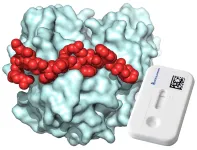(Press-News.org) COLUMBUS, Ohio – Decision-making capabilities of college students – including some graduating this spring – were likely negatively affected by the COVID-19 pandemic, new research suggests.
Students in the small study conducted by researchers at The Ohio State University were less consistent in their decision making during the 2020 fall semester compared to students who had participated in similar research over several previous years.
The researchers compared responses to a hypothetical situation made by students during the pandemic to responses made by students in earlier studies. They found evidence that students in 2020 were more likely to cycle between going with their gut and more thoroughly mulling over their answers depending on how the scenario was described.
“Our theory is that feeling stressed by everything going on was limiting students’ resources to really evaluate the information that was presented to them,” said lead author Melissa Buelow, professor of psychology at Ohio State’s Newark campus.
The research also suggests that the prolonged and wide-ranging uncertainties that came with the global lockdown – far different from an acute stressor imposed in a lab – affected the brain region responsible for problem solving and decision making.
“I think that is one of the more important findings – that the stresses of everyday life can wax and wane, and they can potentially overwhelm your cognitive resources and you can see real downstream effects on everyday activities that require your energy and your effort,” Buelow said. “This study provides additional information to understand why students may have been having difficulty coming to class, focusing on class and getting things turned in – because there was this global event affecting every part of their lives.”
Buelow conducted the study with Ohio State Newark psychology faculty members James Wirth and Jennifer Kowalsky. The research was published recently in the Journal of American College Health.
In autumn 2020, students on Ohio State’s campuses attended classes offered both virtually and in person with reduced density and continued physical distancing, wearing masks and undergoing routine COVID-19 testing. Students were presumed not to be infected with the coronavirus when they participated in this research.
Buelow and her colleagues were inspired to do the study after they referred to their own foggy thinking as “pandemic brain” in casual conversation.
“We said if we are experiencing this, we wonder if others were as well,” Buelow said. “And as we were collecting data, we heard in the popular press about this idea of the stress of COVID leading to difficulty with thinking, processing information and making decisions.”
A clinical neuropsychologist, Buelow has used the Adult Decision Making Competence (ADMC) scale in her research for a decade. The tool presents numerous scenarios, framed in both positive and negative ways, and asks users to respond with their preferred solution or recommendation.
For this study, researchers compared data from a pre-pandemic sample of 722 undergraduates who had been assessed with the ADMC scale to data from 161 students who participated in one of two assessments during the 2020 fall semester.
The main finding: Instead of recognizing that ethics-based scenarios resulted in the same outcome whether presented as a gain or loss, students in 2020 were more likely to answer differently based on how the information was framed.
“Reliance on whether ‘this is a win’ versus ‘this is a loss’ really factored into decision making,” Buelow said.
Despite that inconsistency, the researchers noted that students in 2020 were as confident as pre-pandemic participants that their decisions on accuracy-based questions were correct.
“That struck us as interesting, with potential implications for the health and well-being of individuals adequately perceiving risk,” Buelow said. “Are individuals aware of what they do and don’t know, so to speak? And if you aren’t, does that lead to more risk?”
The researchers assessed another 72 students at two time points during the spring 2022 semester to gauge whether COVID-19 vaccination and loosened mask and distancing requirements lessened the pandemic’s effects on decision making. Their exploratory analysis with this smaller sample found that students were still making less consistent decisions compared to pre-pandemic participants.
Buelow and colleagues are continuing to collect data to track changes in student decision making over a longer period of time.
“Situational factors can affect why people make a good, advantageous decision versus a bad or risky decision, and that is important context to have,” she said. “When we acutely stress individuals in the lab, we see a subsequent lowering of decision-making consistency. These findings really fit in with that – so we can theorize, in the absence of an acute lab stressor, that it was COVID, a much more global factor affecting every aspect of our lives, that affected cognition.”
#
Contact: Melissa Buelow, Buelow.11@osu.edu
Written by Emily Caldwell, Caldwell.151@osu.edu
END
Researchers from universities across the United States will arrive at the U.S. House and Senate on Wednesday for meetings with lawmakers and their staffs about the importance of fundamental science and funding for the National Institutes of Health, the National Science Foundation and the Department of Energy Office of Science.
Their advocacy is particularly crucial this year in light of the current tense negotiations over raising the debt ceiling, which threatens non defense discretionary funding, including for scientific research, public health and many other aspects of federal government funding.
The researchers ...
Research Highlights:
In a study of nearly 170,000 adults in France, lesbian and bisexual women had lower cardiovascular health scores compared to heterosexual women.
In contrast, gay and bisexual men had higher ideal cardiovascular health scores compared to heterosexual men.
The study is the first to examine ideal cardiovascular health scores in sexual minorities.
Embargoed until 4 a.m. CT/5 a.m. ET Wednesday, May 17, 2023
DALLAS, May 17, 2023 — Lesbian and bisexual women were less likely to have ideal cardiovascular health scores compared to heterosexual women, which ...
Statement Highlights:
School-aged children are highly motivated to learn basic life-saving skills, such as recognizing a cardiac arrest, calling for help and performing cardiopulmonary resuscitation (CPR), according to a new scientific statement from the International Liaison Committee on Resuscitation (ILCOR), the American Heart Association and the European Resuscitation Council.
The statement identifies age-appropriate best practices to help children learn various skills that are part of the cardiac arrest chain of survival.
Teaching children about CPR at regular intervals as they age will develop their ...
Common inflammatory disorders such as ulcerative colitis and Crohn's disease can be diagnosed or monitored by measuring the protein calprotectin in stool samples, while serum levels of calprotectin could be used to monitor the inflammation status in rheumatoid arthritis. Calprotectin concentrations in patient samples are typically determined using antibodies that bind and detect the protein, e.g. in lateral flow assays like the now all-too-familiar home COVID-19 test kits.
But there is a problem with antibody-based calprotectin assays: the results can vary depending on the type of antibody ...
In a recent nationwide study from France, lesbian and bisexual women had worse cardiovascular health scores than heterosexual women. The study, which is published in the Journal of the American Heart Association, also found that gay and bisexual men tended to have better cardiovascular health scores compared with heterosexual men; however, rural-residing sexual minority men had worse cardiovascular health compared with heterosexual men.
The study included 169,434 cardiovascular disease–free adults and assessed nicotine exposure, diet, physical activity, body mass index, sleep health, blood glucose, blood pressure, and blood lipids.
“Overcoming preventive ...
A recent analysis of published studies examined a wide range of interventions that include a case manager to help individuals experiencing homelessness find stable housing. The analysis, which is published in Campbell Systematic Reviews, explored components most likely to lead to improvements in housing, health, and other outcomes.
In the analysis of 64 intervention studies and 41 implementation studies mainly from the United States and Canada, investigators found that any type of case management improves homelessness outcomes for people with additional support ...
Combat-related injuries to bone are common in military personnel and can lead to pain and disability. Results from a new study in the Journal of Bone and Mineral Research suggest that amputations for such injuries may negatively affect bone mass.
In the study of 575 male adult UK military personnel with combat-related traumatic injuries and 562 without such injuries, veterans who sustained traumatic amputations often had low bone density in the hip region. Changes in bone health appeared to be mechanically driven rather than systemic and were only evident ...
An article in Health Care Science provides an in-depth analysis of the changes made to the diagnosis and treatment protocol for COVID-19 in China over the course of the pandemic.
The authors compare and summarize each of the 10 versions of the protocol issued by the National Health Commission of China over 3 years, highlighting the evolving scientific evidence and disease situation that informed these changes.
The summary provides valuable insights into the adaptive healthcare management and response to COVID-19 in China, which can inform the global response to the pandemic.
“Clinical ...
Brepocitinib is an oral drug that inhibits certain enzymes involved in inflammation—called tyrosine kinase 2 and Janus kinase 1—and is being tested for the treatment of several immunological diseases. A phase IIb randomized clinical trial published in Arthritis & Rheumatology recently generated promising efficacy and safety data for the use of brepocitinib in adults with moderately-to-severely active psoriatic arthritis.
Overall, 218 participants were randomized and received brepocitinib or placebo for 1 year. After 16 weeks of treatment, 30 and 60 mg daily doses of brepocitinib were superior to placebo at reducing signs and symptoms ...
A vegan diet does not affect maternal breastmilk concentrations of vitamin B2 and carnitine, nutrients essential for the developing infant. These are the results of an Amsterdam UMC study, presented today at the 55th Annual Meeting of the European Society for Paediatric Gastroenterology, Hepatology and Nutrition (ESPGHAN).
Research has found that lactating mothers following a vegan diet compared to mothers with an omnivorous diet showed no difference in the human milk concentrations of vitamin B2 or carnitine, despite these nutrients being found in highest concentrations in animal products.
Using ...

